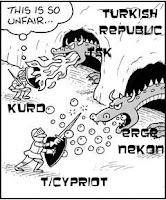 LONDON November 14, 2006 — Turkey complains vociferously about the European Union's unfair treatment of the politically and economically isolated Turkish Cypriots. Why then shouldn't Turkey grant a big chunk of its own citizens - the Kurds - the same rights it demands for people who are not even Turkish nationals?
LONDON November 14, 2006 — Turkey complains vociferously about the European Union's unfair treatment of the politically and economically isolated Turkish Cypriots. Why then shouldn't Turkey grant a big chunk of its own citizens - the Kurds - the same rights it demands for people who are not even Turkish nationals?There are many similarities between Northern Cyprus and the Turkish southeast, where many of Turkey's estimated 15 to 20 million Kurds live. They are geographically similar and are located in sensitive areas - the one off Syria's coast, the other bordering Iran, Iraq and Syria.
Both are relatively isolated and poor, though the Kurds are a lot poorer than the Turkish Cypriots. In both cases, poverty is linked to the unresolved political and security issues around their identity and political status.
But it's the differences that are more striking. Turkey is loudly championing the rights of Turkish Cypriots in the EU. But anyone who champions Kurdish rights in Turkey risks being accused of separatism and even terrorism.
While Turkey expects international support for its Cyprus solution, based on a bizonal, bicommunal federation with political equality between the two communities, it argues the precise opposite for its own Kurdish citizens.
For many Turks, any Kurdish request for national recognition - whether to be called Kurdish citizens of Turkey rather than Turks, or for a federation, or to use the Kurdish language in schools or in the media - is perceived as an attack on the Turkish nation and its territory.
While many Kurds are ready to remain within a unitary Turkish state so long as they can have full cultural rights, for most Turks the idea of Turkish Cypriots accepting simply minority status in a Greek-Cypriot dominated Republic of Cyprus is anathema.
The Turkish habit of stamping slogans onto mountainsides is evident both in Northern Cyprus and in southeastern Turkey. But on Cyprus, the slogans declaring the north to be the Turkish Republic of Northern Cyprus are directed at the Greek Cypriots across the Green Line, while in the desolate mountains of southeast Turkey, the slogans assert "one state, one flag, one language."
Many Turks will argue that the Cyprus problem and the Kurdish problem are not the same due to the violence of the Kurdistan Worker's Party (PKK), which has been fighting the Turkish military for over 20 years and is and labeled as a terrorist group by Turkey, the United States and the European Union. But why should violence by a minority of Kurds mean curtailing the rights of the majority of Kurds?
How can there be any hope of a political solution in either place without respect for the rights of both minority groups?
Where are the political leaders? Prime Minister Recep Tayyip Erdogan is struggling on many fronts, not least to win re-election next year in the face of a nationalist and secularist onslaught, and also to keep Turkey's EU process on track despite negative signals from Europe and waning public enthusiasm in Turkey. Thus Erdogan may not be capable of making a deal on Cyprus, nor of making any progress on the southeast in the face of growing hostility both to him and to the Kurds.
And yet while some hardline Turkish nationalists may want an independent Northern Cyprus, and some radical Kurds may dream of an independent Kurdistan, the fact is that neither Turkey's southeast, nor Northern Cyprus has a realistic future as independent state.
In both cases the best hopes for an acceptable solution lie with a continuation of Turkey's EU negotiations.
Much of the solution lies in Turkey's hands. If Turkey's government and public stand up consistently for democracy and human rights - whether in support of Turkish Cypriots or Turkey's Kurds - and against the undemocratic political pronouncements of Turkey's military and nationalists, then it will be hard for democratic European politicians to give in to their nationalists and to suspend membership negotiations with Turkey.
Find link to published article by clicking the link below:
The Cypriots and the Kurds - Opinion - International Herald Tribune Kirsty Hughes | Published: Tuesday, November 14, 2006
Some animals more equal than others in Turkey? Kirsty Hughes 2006
The Cypriots and the Kurds - Opinion - International Herald Tribune Kirsty Hughes | Published: Tuesday, November 14, 2006
Some animals more equal than others in Turkey? Kirsty Hughes 2006



















